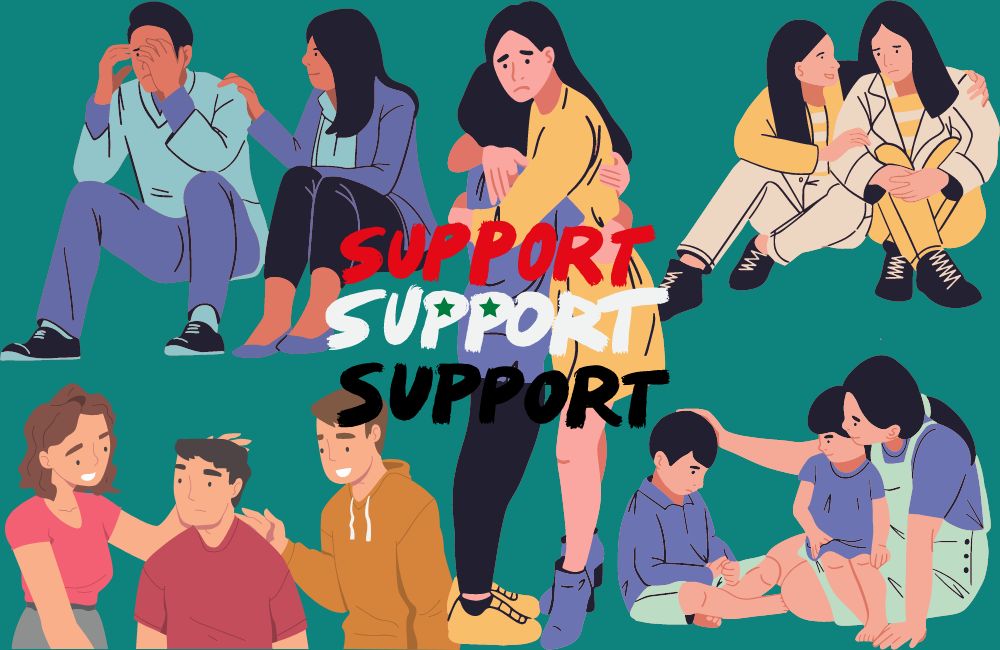As an ESL teacher, I’ve witnessed many students grappling with not only the mechanics of the English language but also with expressing complex emotions and feelings. I’ve seen how language barriers sometimes make it harder for them to seek emotional support when needed.
No worries! I’ll provide some English expressions and tips to help you ask for the emotional support your need from the people surrounding you.
To ask for emotional support in English, it’s important to use “I” statements to express your feelings and be direct about the type of support you need. For instance, you might say, “I’m feeling quite anxious these days. Can we chat for some time? I just need someone to listen.”
Are you looking for a book or a guide to help you learn and improve your English? You may try English Made Easy Volume One: A New ESL Approach: Learning English Through Pictures (Amazon Link).
Now, we’ll first explore a list of more than 50 English expressions that can be used to ask for emotional support from different people who are close to your life. Each phrase is designed to communicate your feelings effectively and ask for the support you need. I’ll also share some useful tips that will further assist you in this process.
Table of Contents
- 50+ English Expressions to Ask for Emotional Support
- Tips to Ask for Emotional Support in English
- Sample Conversation: Asking for Emotional Support in English
- In Conclusion
- 10 Frequently Asked Questions Related to Asking for Emotional Support in English
50+ English Expressions to Ask for Emotional Support
In times of emotional distress or personal crisis, reaching out for support can be a challenging but necessary step. Whether it’s a friend, a family member, a co-worker, or your partner, each person in your life can provide a unique form of support and understanding.
However, knowing the right words to express your feelings and ask for help can sometimes be difficult. To help you navigate these tricky conversations, I’ve compiled a list of forty English expressions you can use to ask for emotional support.
These phrases are divided into four categories based on your relationship with the person you are contacting. Remember, it’s okay to ask for help when you need it.
1. From Friends
Your friends can be a great source of emotional support, offering comfort, advice, and reassurance. Here are ten English expressions you can use to reach out to them.
- I’ve been having a hard time. Could we chat?
- I’m feeling low and could use a friendly ear. Are you free?
- Can we hang out? I’ve been feeling quite isolated lately.
- Can I share something with you? I’ve been feeling really anxious.
- Can we talk? I need some advice about a situation that’s bothering me.
- I’m feeling a bit overwhelmed and could use your perspective.
- I trust you and need someone to vent to. Can we talk?
- I’m feeling stressed and could use some company.
- Can we get together? I’ve been feeling really down.
- I need a chat. Can you spare some time?
- I’m feeling like I’m not myself lately. Can we talk?
- Are you available for a chat? I could use a friend right now.
- I’m not feeling great and was wondering if we could hang out.
- I’ve been struggling with some things. Can I share them with you?
- I’m dealing with a lot and could really use your advice.
2. From Family Members
Family can often provide a strong support system. Here are some expressions to use when asking for emotional support from your family members.
- I’m having a tough time. Can we sit down and talk?
- Can we spend some time together? I’ve been feeling a bit lonely.
- I’ve been feeling overwhelmed. Can I talk to you about it?
- I need some advice. Are you available to chat?
- I’ve been feeling stressed lately. Can we discuss this?
- I’m feeling anxious about some things. Can I share them with you?
- I could use some reassurance. Can we talk?
- Can we have a heart-to-heart? I’m going through a tough time.
- I’m having a difficult time and need some family support.
- I’m feeling down and could use a chat. Are you free?
- I’m feeling lost. Can we have a family talk?
- I’m not in a good place right now. Can I share my feelings with you?
- I’ve been feeling troubled lately. Can we have a chat?
- Can we talk? I’ve been feeling like I’m carrying a heavy load.
- I need some family comfort. Can we sit together and talk?
3. From Close Co-Workers
Your co-workers can provide a unique form of support as they understand the pressures and challenges of your work environment. Here are ten English expressions to ask for their support.
- I’m feeling overwhelmed by this project. Can we talk?
- I’ve been having a hard time at work. Can we chat during the break?
- I’m feeling a bit stressed and could use some advice. Are you free?
- I could use a sounding board. Can we discuss something?
- I’m feeling anxious about this presentation. Can we review it together?
- I’m not sure how to handle this situation. Can you help?
- Can we talk? I need some perspective on a work-related issue.
- I’m feeling a bit under pressure. Can we have a chat?
- I’m finding it hard to balance everything. Can you give me some advice?
- I’m having a tough time with this task. Can we brainstorm together?
- This project has been overwhelming me. Can we talk it over?
- Can we have a quick chat? I’m finding it hard to handle some work issues.
- I’ve been feeling overworked and could use some guidance. Can we discuss this?
- I’m facing a challenging situation at work. Can we brainstorm solutions together?
- I’m feeling the pressure of this task. Can we review it together?
4. From a Partner
Your partner can offer emotional support in a deeply personal way. Here are some expressions to use when asking for their support.
- I’ve been feeling really anxious lately. Can we talk?
- I’m going through a rough patch and need your support. Can we chat?
- I’m feeling overwhelmed and could use your comfort. Are you available?
- I need to vent about something that’s bothering me. Can we talk?
- I’m feeling really low. Can you hold me?
- I’m dealing with a lot of stress right now. Can we have a quiet night in?
- Can we spend some quality time together? I’ve been feeling a bit isolated.
- I’m feeling a bit lost and could use your guidance. Can we chat?
- I’ve been feeling a bit down and need your reassurance. Can we spend some time together?
- I’m feeling unsettled about some things. Can we sit and talk?
- I’m not feeling like myself. Can we have a heart-to-heart?
- Can we spend some quiet time together? I’ve been feeling stressed.
- I’ve been carrying some heavy feelings. Can we talk?
- I need to vent. Can we have some time just for us to talk?
Tips to Ask for Emotional Support in English
Navigating the world of emotions can be a labyrinth, especially when it comes to seeking emotional support. Though it’s vital to maintaining mental well-being, it can often seem daunting, even more so when doing it in a language that’s not your own.
However, having the right tools can make this process easier and more effective. In this section, we’ll explore practical tips to help you express your feelings and ask for emotional support in English. These tips are not only about what to say but also about fostering the right mindset and approach.
1. Be Open About Your Feelings
One of the first steps in seeking emotional support is being honest and open about your feelings. It’s essential to accurately express what you’re going through to receive the appropriate kind of support. Use ‘I’ statements to express your emotions. For instance, instead of saying, “It’s a hard situation,” say, “I feel stressed by this situation.” This conveys your feelings more accurately and makes it easier for the listener to empathize with you.
2. Choose the Right Person
Emotional support is as much about who you’re contacting as it is about what you say. Identifying a trusted person to share your feelings with is crucial. This individual should be someone who can provide the emotional support you need respectfully and empathetically. Consider the person’s relationship with you, their capacity to support you, and their past responses to your struggles when making your decision.
3. Practice Active Listening
When seeking emotional support, remember it’s a two-way street. Encourage the person you’re talking to to share their thoughts and feelings. This promotes a balanced exchange where both parties feel heard and valued. It also allows the other person to express their support and offer their perspective.
4. Be Direct About Your Needs
Sometimes, people hesitate to offer support because they’re unsure of what you need. Be clear about the type of support you’re seeking. Whether you’re looking for advice, a listening ear, or reassurance, being direct will help others understand how they can best support you. For example, you might say, “I’m feeling quite stressed about work. Could we chat? I just need someone to listen.”
5. Use Non-Verbal Communication
Non-verbal cues can also be important for conveying your emotional state and need for support. Maintain eye contact, use open body language, and show genuine emotion. This can help the person you’re talking to better understand your feelings and respond appropriately.
Remember, asking for emotional support is not a sign of weakness but an act of self-care. Don’t hesitate to contact the people around you when you need support. By using these tips and the English expressions shared earlier, you’ll be well-equipped to ask for and receive the emotional support you need.
Sample Conversation: Asking for Emotional Support in English
Situation: After a particularly challenging day, Jenna reaches out to her close friend, Liam, for some emotional support.
Jenna: Hey Liam, do you have a moment? I’m feeling a bit overwhelmed and could use someone to talk to.
Liam: Of course, Jenna. I’m here for you. What’s on your mind?
Jenna: It’s just been one of those days where everything seems to go wrong. I feel like I’m juggling too much, and it’s getting to me.
Liam: I’m really sorry to hear that. Remember, it’s okay to feel this way. Let’s talk it out. Sometimes just sharing can help.
Jenna: Thanks, Liam. I really appreciate you being there for me. It means a lot.
In Conclusion
Navigating emotional conversations can be challenging, especially in a second language. But remember, everyone deserves support, and it’s perfectly okay to ask for it. With these expressions and tips, you can better express your needs and ask for emotional support in English. Remember, seeking help is a sign of strength, not weakness, and you’re not alone in this journey.
10 Frequently Asked Questions Related to Asking for Emotional Support in English
1. Why is it important to express the need for emotional support?
Expressing the need helps in processing emotions, provides relief, and strengthens interpersonal connections.
2. How can I start the conversation when seeking emotional support?
Starting with phrases like “I’m going through a tough time” or “I could use a listening ear” can initiate the conversation.
3. Is it okay to be direct when asking for support?
Absolutely. Being direct, such as saying, “I need some emotional support right now,” can be effective in conveying your feelings.
4. How can I ask for support without feeling like a burden?
Remember that everyone needs support at times. You can say, “I hope I’m not burdening you, but I could really use someone to talk to.”
5. What if the person I reach out to is unavailable or unresponsive?
It’s essential to have multiple support systems or consider professional help if needed. It’s okay to seek assistance elsewhere.
6. How can I express gratitude to someone who offered support?
Simple phrases like “Thank you for being there for me” or “I appreciate your understanding” can convey gratitude.
7. Is it essential to explain the reason for needing support?
Not necessarily. It’s okay to express the need for support without diving into specifics if you’re not comfortable.
8. Can I ask for emotional support online or through text?
Yes, the medium doesn’t matter as long as you reach out to trustworthy individuals or platforms.
9. How can I offer support in return?
By saying, “I’m here for you too,” or “Let me know if you ever need to talk,” you can reciprocate the support.
10. What should I do if I feel I’m not getting the support I need?
Consider expressing your feelings more explicitly or seeking support from professionals or other trusted individuals.






